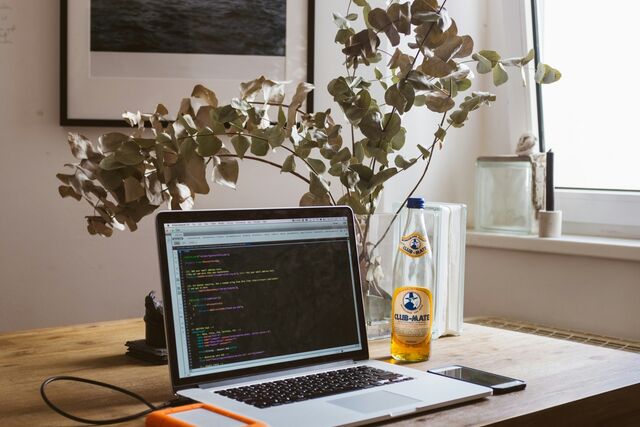Work and explore: Germany’s freelance visa for digital nomads
Germany is one of the most popular destinations for digital nomads in Europe — and for good reason. With efficient transport, reliable Wi-Fi, and creative hubs like Berlin, Munich, and Hamburg, it’s a great base for freelancers and remote professionals working from abroad.
While Germany doesn’t have a visa officially called a “digital nomad visa,” it offers two established residence permits ideal for remote workers: the Freiberufler visa and the Selbständiger visa.
This guide explains the difference between them, who qualifies, and how to apply— plus what to expect when you trade your co-working spot for a café table with the scent of pretzels and productivity in the air.
💡 Just starting your research?
Read our guide to digital nomad visas in Europe

Photo by Jay Wennington on Unsplash
- What are the digital nomad visa options in Germany?
- Who can apply for the Freiberufler visa?
- What are the requirements for the German freelance visa?
- Application process for the German freelance visa
- How long is the visa valid?
- Can you travel around Europe with this visa?
- What about the Selbständiger visa?
- Will you need to pay taxes in Germany?
- Start your journey with the right visa
What are the digital nomad visa options in Germany?
Germany offers two visa routes for non-EU nationals who want to live and work independently in the country:
- Freiberufler visa – for freelance professionals such as writers, designers, developers, consultants or teachers
- Selbständiger visa – for self-employed entrepreneurs or business owners contributing to the German economy
Both fall under Section 21 of the German Residence Act.
Learn more from the official source:
Make it in Germany – Self-employment visa options
Who can apply for the Freiberufler visa?
The Freiberufler visa is the most popular option for digital nomads. It’s designed for people who work independently in intellectual or creative professions — basically, if you can work from your laptop and send an invoice, Germany probably has a form for it.
Typical eligible roles include:
- IT specialists and software developers
- Designers and photographers
- Writers, journalists, translators
- Teachers or tutors
- Marketing or business consultants
- Engineers and scientists
You don’t need German clients to qualify — though having one or two can strengthen your case (and might help you practise your Guten Tag).
What are the requirements for the German freelance visa?
To apply, you must show that you can support yourself financially, that your work benefits the German economy, and that you plan to live and work in Germany long-term.
Key requirements:
- Valid passport
- Proof of qualifications or professional experience
- Portfolio or CV showing your work
- Letters of intent from clients (ideally including German ones)
- Proof of income or savings (around €3,000/month recommended)
- Health insurance valid in Germany
- Rental agreement or accommodation proof
- Financial plan for at least 3 years
- Pension plan (if over 45)
Yes, it’s a long checklist — but Germans do love efficiency, and you’ll thank them later when every document fits neatly in a binder.
Application process for the German freelance visa
You’ll begin by applying for a freelance entry visa from your home country. Once in Germany, you’ll convert it into a freelance residence permit.
1. Gather your documents
Prepare your passport, professional credentials, client contracts, proof of income, and accommodation documents.
(Colour-coded folders optional, but highly recommended if you want to blend in.)
2. Apply for the freelance entry visa
Book an appointment at your nearest German embassy or consulate. This is typically a National (D) visa valid for 90 days.
Find your nearest German embassy
3. Wait for approval
Processing usually takes 4–12 weeks, depending on your embassy.
4. Travel to Germany
Once approved, you can enter Germany and have 90 days to complete your residence permit application.
5. Register locally and apply for your residence permit
Once in Germany:
- Register your address (Anmeldung) — here’s how it works
- Open a local bank account
- Register at the tax office to get your Steuernummer (tax number)
- Apply for your residence permit at the immigration office
Pro tip: master the art of queuing — it’s practically a national sport.
How long is the visa valid?
The initial residence permit is typically granted for one year, with the option to extend for up to three years, provided your freelance activity remains viable.
Can you travel around Europe with this visa?
Yes. With a valid German residence permit, you can travel freely throughout the Schengen Area for short stays (up to 90 days in any 180-day period) without needing additional visas.
(Once your paperwork’s done, reward yourself with a weekend in Prague — you’ve earned it.)
What about the Selbständiger visa?
If you’re launching a business or running a company, the Selbständiger visa might suit you better.
It’s ideal for entrepreneurs whose work contributes to the German economy. A solid business plan, proof of funding, and evidence of market demand in Germany are all essential.
Will you need to pay taxes in Germany?
Yes. Once you obtain your residence permit, you become a tax resident and must declare your global income in Germany.
Work with a qualified local tax advisor (Steuerberater) to make sure you stay compliant — and maybe learn how to pronounce Steuerberater while you’re at it.
Start your journey with the right visa
If you’re not ready for residence status yet, you can still explore Germany on a tourist, business or study visa — a great way to test life in the country before committing long-term.
Travelisa helps you prepare these visa applications with accuracy and ease, ensuring your documents meet official requirements. Explore Travelisa’s visa assistance services
Tip: Once your paperwork’s approved, celebrate the German way — with a beer garden, a pretzel, and the satisfying sound of a stamp in your passport.